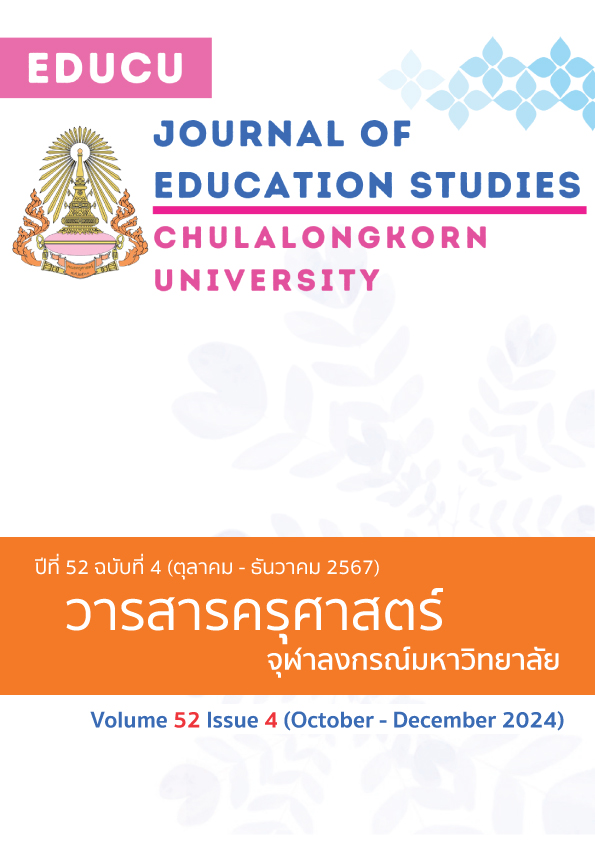สมรรถนะผู้สำเร็จการศึกษาตามมาตรฐานคุณวุฒิระดับอุดมศึกษา สาขาวิชาการบริหารการศึกษา
DOI:
https://doi.org/10.14456/educu.2024.54คำสำคัญ:
Competency, Thai Qualification Frameworkบทคัดย่อ
การวิจัยครั้งนี้ ผู้วิจัยมีวัตถุประสงค์เพื่อ 1) ศึกษาสมรรถนะผู้สำเร็จการศึกษาตามมาตรฐานคุณวุฒิระดับอุดมศึกษา สาขาวิชาการบริหารการศึกษา 2) พัฒนาตัวบ่งชี้สมรรถนะผู้สำเร็จการศึกษาตามมาตรฐานคุณวุฒิระดับอุดมศึกษา สาขาวิชาการบริหารการศึกษา และ 3) สร้างคู่มือการพัฒนาสมรรถนะผู้สำเร็จการศึกษาตามมาตรฐานคุณวุฒิระดับอุดมศึกษา สาขาวิชาการบริหารการศึกษา เครื่องมือที่ใช้ในการเก็บรวบรวมข้อมูล ได้แก่ แบบสัมภาษณ์กึ่งโครงสร้าง ใช้เก็บรวบรวมข้อมูลและข้อสรุปที่ได้จากการสัมภาษณ์ผู้ทรงคุณวุฒิ มาพัฒนาเป็นตัวบ่งชี้แล้วสร้างเป็นแบบสอบถามเพื่อนำไปให้ผู้ทรงคุณวุฒิประเมินความเหมาะสม และการประชุมสัมมนา ผู้วิจัยได้กำหนดขั้นตอน
การดำเนินการวิจัยออกเป็น 3 ระยะ ได้แก่ ระยะที่ 1 การศึกษาองค์ประกอบสมรรถนะผู้สำเร็จการศึกษาตามมาตรฐานคุณวุฒิระดับอุดมศึกษา สาขาวิชาการบริหารการศึกษา ระยะที่ 2 การพัฒนาตัวบ่งชี้สมรรถนะผู้สำเร็จการศึกษาตามมาตรฐานคุณวุฒิระดับอุดมศึกษา สาขาวิชาการบริหารการศึกษา และ ระยะที่ 3 การสร้างคู่มือพัฒนาสมรรถนะผู้สำเร็จการศึกษาตามมาตรฐานคุณวุฒิระดับอุดมศึกษา สาขาวิชาการบริหารการศึกษา ผลการวิจัย พบว่า 1) องค์ประกอบสมรรถนะผู้สำเร็จการศึกษาตามมาตรฐานคุณวุฒิระดับอุดมศึกษา สาขาวิชาการบริหารการศึกษามี 4 ด้าน ได้แก่ ด้านความรู้ ด้านทักษะ ด้านจริยธรรม และด้านลักษณะบุคคล 2) ตัวบ่งชี้สมรรถนะผู้สำเร็จการศึกษาตามมาตรฐานคุณวุฒิระดับอุดมศึกษา สาขาวิชาการบริหารการศึกษา มี 80 ตัวบ่งชี้ ได้แก่ ด้านความรู้ ระดับปริญญาโท 10 ตัวบ่งชี้ ระดับปริญญาเอก 10 ตัวบ่งชี้ ด้านทักษะ ระดับปริญญาโท 10 ตัวบ่งชี้ ระดับปริญญาเอก 10 ตัวบ่งชี้ ด้านจริยธรรม ระดับปริญญาโท 10 ตัวบ่งชี้ ระดับปริญญาเอก 10 ตัวบ่งชี้ และด้านลักษณะบุคคล ระดับปริญญาโท 10 ตัวบ่งชี้ ระดับปริญญาเอก 10 ตัวบ่งชี้ และ 3) ผลการประเมินคู่มือการพัฒนาสมรรถนะผู้สำเร็จการศึกษาตามมาตรฐานคุณวุฒิระดับอุดมศึกษา สาขาวิชาการบริหารการศึกษา โดยแยกเป็น 4 ด้าน ได้แก่ ความถูกต้อง ความเหมาะสม ความเป็นไปได้ และความเป็นประโยชน์ โดยภาพรวมอยู่ในระดับมากที่สุด เมื่อพิจารณาเป็นรายข้ออยู่ในระดับมากที่สุดทุกข้อรายการ
เอกสารอ้างอิง
Division of Educational Law and Culture, Office of the Council of State. (2022). Spirit of higher education
act 2022 B.E. https://www.ops.go.th/images/CHES/docs/e0b980e0b888e0b895e0b899e0b8b2e0b
de0b8b2-2562_b4094.pdf
Educational and Cultural Law Division Office of the Council of State. (2022). Purpose of the higher education act (2019). http://acad.vru.ac.th/about_annoucement/11-2562.pdf
Educational News Team. (2022). Ministry of Education's announcement of the ministerial regulations on higher education framework clearly point out the upgrade - develop the manpower of the country. https://www.matichon.co.th/education/news_3265452
Nuchanapa Ruen-obchey. (2022). Policies and guidelines for education management of the new higher
education framework. https://www.youtube.com/watch?v=sF9Jpz7ELbM
Ministry of Higher Education, Science, Research and Innovation Act 2019, Subject: Higher Education
Qualification Standards 2022. (2022). Royal Thai government gazette, 139(20), 28-31.
The Office of the Permanent Secretary of the Ministry of Higher Education, Science, Research and Innovation. (2022). Higher education strategies to produce and develop the country's manpower 2021 – 2027 revised edition 2023 – 2027. (2022, October 10).
https://www.ops.go.th/th/content_page/item/4086-2021-10-14-07-46-10
The Office of the Basic Education Commission. (2017). Competency 2018. Ministry of Education.
Makmeesup, A. (2013). Ethics of educational administrators. Silpakorn University.
ดาวน์โหลด
เผยแพร่แล้ว
รูปแบบการอ้างอิง
ฉบับ
ประเภทบทความ
สัญญาอนุญาต

อนุญาตภายใต้เงื่อนไข Creative Commons Attribution-NonCommercial-NoDerivatives 4.0 International License.




